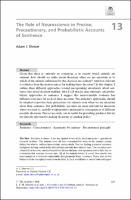Chapter 13 The Role of Neuroscience in Precise, Precautionary, and Probabilistic Accounts of Sentience
Abstract
Given that there is currently no consensus as to exactly which animals are
sentient, how should we make moral decisions when we are uncertain as to
which of the animals influenced by that decision are sentient? And how relevant
is evidence from the neurosciences for making these decisions? In this chapter, I
outline three different approaches toward incorporating uncertainty about sentience
into moral decision-making: what I call precise, precautionary, and probabilistic
approaches to sentience. I suggest that neuroscientific evidence has
different relevance for each of these accounts. Precautionary approaches should
be adopted to provide basic protections for animals even when we are uncertain
about their sentience, but probabilistic accounts are more relevant for decisions
where we need to carefully weigh positive and negative consequences of different
possible decisions. Precise accounts can be useful for providing guidance but are
not directly relevant for making decisions or guiding policy.
Keywords
Sentience, Consciousness, Arguments by analogy, Precautionary principlePublisher
Springer NaturePublisher website
https://www.springernature.com/gp/products/booksPublication date and place
2020Grantor
Classification
Neurosciences


 Download
Download